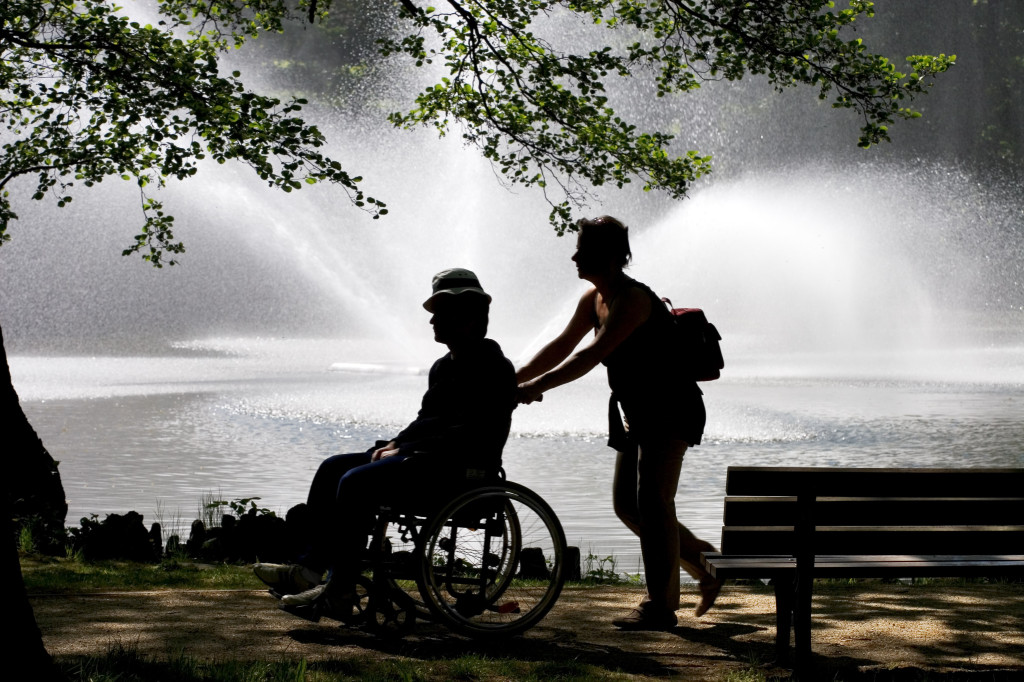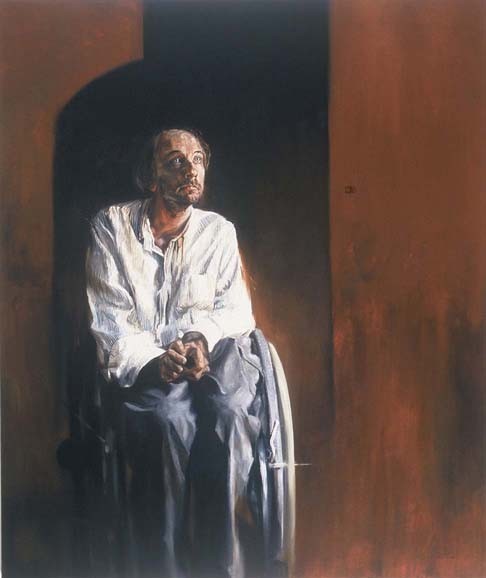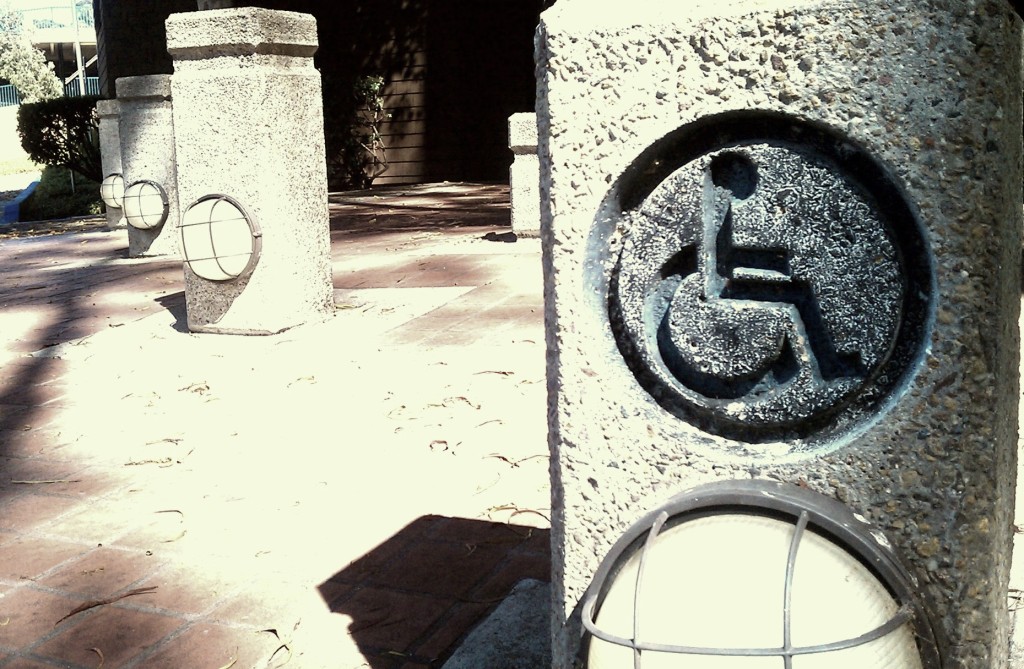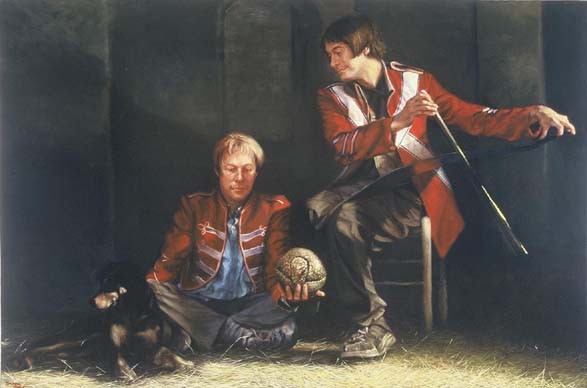
Credit: Must University Blog
I realized that I hated disabled people on November 8, 2013, while limping along a cobblestone lane. It was one of those rare blue mornings in Oxford when the sun stretches through the spires like a cat uncurling in a cloud of pipe smoke. In that light, I saw my shadow, bent over a cane, and wondered why I needed to talk about my accident so much. To tell everyone I met that the scars, the hobble, my one shrunken calf, were neither permanent nor original. “I wasn’t always like this and won’t be forever,” I wanted to say to my new friends, strangers on the Tube, the Fellows and Fathers and Dons of Oxford. The desire to wave my cane and scream, “I was not born this way” consumed me, and I sought opportunities in every conversation to move to the crucial question. “What happened to you?”
My need to explain followed, in part, from the need of others to know: I might be eating lunch and see a colleague and rise to shake his hand. Then he would see the cane, that ugly black thing, and his eyes would turn from my face and I could sense the question bubbling on his fat, pursed lips. But the intrusive demand to tell without being asked, without even a compassionate nudge, could not be explained away as a natural response to natural curiosity. My wish to be known in such a particular way—for my story to be heard—flowed from an inner source. As I shuffled, three-legged, avoiding the busted seams of medieval bricks, I saw my shadow cross the stones and finally understood my need to narrate as a need to differentiate. I needed to distinguish myself from people who had been born disabled and would be forever. I had nurtured a fear and hatred of the disabled, who I believed weak in body and spirit, and hid it from myself. I opened a hole inside my heart and whispered into it: I hate myself because I am like them.
Before my accident, I had dedicated myself to toughness. I ran sixteen miles on a treadmill staring at a wall, starved myself to make cafeteria mush a delicacy, endured marathon study sessions in total isolation. The threat of the disabled body was its imperfection. Indoctrinated into a fascist understanding of a virtuous life by my coursework, our culture, and my own twisted will, I nurtured a secret loathing of difference. Because I wished for a more perfect me than I could ever achieve, the presence of disease, disability, and death terrified me. Now that I too was diseased, disabled, and had faced the immediate possibility of my own death, I had become that which I hated. Yet I believed that I would not always be so weak, that I would endure and triumph as I always had before. And so I needed to announce to the world my status as a traveler passing through, not a permanent resident in a nation of the disabled. The moment I looked behind and witnessed my disgust with other disabled people, my heart seethed with self-loathing. How could I be such a hateful person? I resolved to stop narrating my impairment.
There is a difference between impairment, a condition that causes loss or difference in physiological or psychological function, and disability, the loss of opportunities to participate in society because of social, political, and environmental barriers. Thus the medial dislocation of my right subtalar joint, multiple fractures in that foot, a high ankle sprain, and scarring on my knees and right forearm were my impairments. My inability to press the gas pedal and drive myself to the mall, to walk from my car to the front door, to climb stairs, or to shower or use an unmodified toilet, and my shame and social stigma, were components of my disability. Although I transitioned from a wheelchair to a walker to a cane and now walk “normally,” without support, I still cannot run even a step to escape muggers, double decker buses, or wild dogs. My foot aches before the perpetual Oxfordshire gray opens into rain. I do two hours of physical therapy a day to maintain my lifestyle. While my impairment is temporary, my disability persists both in the residual pain and inconvenience I experience and in my social life, where the memory of my once very visible impairment continues to exert a gravitational effect on the behavior of friends and family. I went to a pub with a girl who asked me why I wasn’t “gimpy” anymore. My closest childhood friends who visited me when I could not walk or dress myself will always treat me like an antique vase. My siblings, who watched me collapse from my walker in a fit of frustrated tears, can never return to the image of me as untouchable older brother. Once upon a time I needed help, and that is enough to erase the shadow of the person I was. I refer to the time before my accident as another life. In another life, I ran and stood on my tiptoes and believed myself to be an independent person. An adult member of society dependent on no one for help.
As I began to explore my disability, I turned to television and film and literature. At first I thought that studying narratives about disabled characters would help me tell my own story. But watching Lost and The Usual Suspects and reading Richard III unsettled my faith in the value of narrative. John Locke, Verbal Kint, and Richard told parables about overcoming disability and becoming independent men, and yet they seemed nothing more than examples of how narrative itself is disabling. My prejudices were my responsibility, but I came to understand my dependence on storytelling as a cultural expectation.

Credit: Sunaura Taylor
For example, I borrow my use of “in another life” from a character on the television show Lost, Desmond Hume, who loses his way on a sailing trip around the globe, lands on a mysterious island, and spends three years trapped in a bunker before the survivors of Oceanic Flight 815 find him. His catchphrase, “See you in another life, brother,” refers to the disconnect among his alien existence on the island, his ordinary life before, and the probability of something stranger happening in the future.
Desmond’s island fulfills one of our most basic fantasies about health—that a magic cure exists outside medicine, a healing power that can restore us to the people we were before accident or disease. John Locke boards Oceanic 815 in a wheelchair, but when the plane crashes, he walks away from the wreck. The transformation of Locke from paraplegic to Bear Grylls demands a flashback. We need to know how John Locke came to be disabled and why he was saved. Impaired Locke is overcome by a tedious job selling boxes, an abusive boss, and a tour operator in Australia who forbids him from participating in a “walkabout” because, of course, Locke can’t walk. Flashbacks to Locke’s accident are liberating only in the sense that the voyeur satisfies an unbearable desire. The audience craves the narrative of temporary impairment, and in turn, that narrative lies at the center of Lost’s meticulous plotting. Locke’s story of loss and redemption opens a commentary on human freedom that unites the dozen or so character arcs throughout the series. Locke’s catchphrase, “Don’t tell me what I can’t do,” shouted both by Locke on the island and Locke in the wheelchair, teaches us that action depends on spiritual and physical wholeness. The mantra becomes a motto of self-reliance: Locke, and the other heroes on Lost, do not need help from others.
Stories about temporary impairment, like Lost, have come to dominate our imagination of disability. A redemption story in which the protagonist overcomes his impairment to serve as inspiration absolves us of guilt: the guilty pleasure we take from suffering and our conscious involvement in disabling environments on a daily basis. The desire for narrative, or the demand for disabled people to tell us their stories so that we might use them for spiritual sustenance, has foreclosed the potential for policy reform and social revolution. We bathe in a warm broth of chicken soup stories when we could be taking action to change our own practices that reduce disabled people to entertainment or cardboard icons of victimhood, moral instruction, and platitudinous wisdom.
For exercise, I wheeled around the track at my high school, six miles by the end of the summer, and then practiced walking, first with a scooter, then with my cane. Spectators paunchy in sweatpants asked me what happened. I told them stories. “Gambling debts.” “Rollercoaster accident.” “Zookeeper.”
For scholars like David Mitchell and Sharon Snyder, narratives work like prosthetic limbs. Narrative tries to ”resolve or correct” “a deviance marked as improper to a social context.” In my experience as a temporarily impaired person, narrative could resolve and correct what I perceived to be my improper association with permanent disability. By narrating my accident, I could return myself from deviance to a proper social context. Our culture, which has fetishized the power of narrative and the testimony of personal experience to correct asymmetries of power between the nondisabled and the disabled or doctors and patients, has reconstructed the problem of disability through the practice of liberation storytelling. Narrative did not liberate me. Narrative entrapped me within a fixed definition of the self, an inflexible history, a legible character computable in social contexts. My story inspired people, and that was supposed to be enough justification to speak about my impairment. What I have only recently recognized is that my narrative, motivated by hate, rehearsed our culture’s very specific narrative of temporary impairment and did nothing to advance the cause of equality or justice for impaired people or to attack the ideological basis of disability: that disabled people require help, and “normal” people do not.

Credit: Flickr
Kevin Spacey has built a career around prosthetics. In The Usual Suspects, Spacey plays Verbal Kint, a con man with cerebral palsy brought in for questioning about a spree of grisly murders. To the gratification of Customs Agent Dave Kujan, Kint spins a fantastic but persuasive story. At the end of the film though, we watch Verbal limping along the street, slowly converting his stagger into a smooth, unremarkable stride. Intercut with the reveal of Verbal’s deception is Kujan’s epiphany that Verbal assembled his story from random words and objects around the office. The finale of The Usual Suspects illuminates Kevin Spacey performing Verbal Kint’s performance of disability. Disability emerges as criminal, a con, and the audience is asked to reread everything preceding as nothing more than the story of how Verbal’s performance of disability was, like Spacey’s, a temporary and affected impairment.
Similarly, Spacey’s recent performances in Shakespeare’s Richard III at the Brooklyn Academy of Music do not end with the title character’s death, but instead with a transformation à la Verbal Kint or John Locke. Spacey, who had limped hunchbacked around the stage, puts down his cane and bows. Only then does the audience understand Richard III as a story about Kevin Spacey’s performance. As impairment comes to substitute for disability, the production implies that the latter ends with the former. The narrative of impairment as temporary tells us a story about permanent disability—that it is manipulative, affected, fraudulent, and the visible shadow of an internal but nevertheless detectable weakness. Paradoxically, the act of storytelling becomes a sign of strength. In the famous “winter of our discontent” soliloquy that begins the play, Richard says:
Why, I, in this weak piping time of peace,
Have no delight to pass away the time,
Unless to spy my shadow in the sun
And descant on mine own deformity:
And therefore, since I cannot prove a lover,
To entertain these fair well-spoken days,
I am determined to prove a villain
And hate the idle pleasures of these days.
Richard explains, not without irony, that his only pleasure is to glimpse his own shadow and then to discuss the impairment that deforms it. His disability is that he cannot play the romantic hero, but instead must be the villain. If the strength of narrative will triumph over the weakness of disability, it is unlikely to free Richard from his broken flesh. Richard, who will never pass for a noble king, must come out as a disabled criminal to avoid the deadly anonymity of idleness.
Disability activists have borrowed a vocabulary of “coming out” and “passing” from theorists of race and gender. Just as one might come out as gay or pass as white, a disabled person can publicly identify as such or remain “in the closet.” An increasing population of people with nonvisible or invisible disabilities has created the need for this vocabulary. According to the 2010 Americans With Disabilities Report compiled by the United States Census Bureau, of the 30.6 million individuals who reported lower body limitations, only 15.2 million or 50 percent used a wheelchair, cane, crutches, or walker. Although the practice of coming out as disabled or passing as non-disabled are not exactly analogous to their racial, sexual, or gender equivalents, coming out and passing have been useful terms for creating alliances with other oppressed communities and for describing the experiences of disabled people.

Credit: Sunaura Taylor
Although coming out can be an empowering political experience, passing as non-disabled is not necessarily a self-betrayal or assimilationist. As Ellen Samuels argues in “My Body, My Closet: Invisible Disability and the Limits of Coming Out,” the decision either to come out or to pass is intensely personal and demands sacrifice wherever it promises opportunity. If coming out as disabled makes disability politically visible, it also exposes the newly marked “gimp” to disabling social practices, and if passing allows the clandestine “gimp” to blend in, it silences political voice while enhancing social presence. Disability is a state of simultaneous visibility and invisibility, of being seen as different and being erased from the landscape. Therefore, coming out and passing have complex and paradoxical effects on a disabled person’s status in social and political life.
Being temporarily impaired means experiencing a transition from wanting to pass to wanting to come out. I am no longer visible as disabled, and therefore need to announce my solidarity with disabled activists. I need to come out and end my invisibility as a political agent. My narrative has shifted from explaining how I came to be temporarily impaired to why I am permanently disabled.
What if we reject our desire to know the narrative of temporary impairment? What if we contest the idea that with the end of visible impairment comes the end of disability? My hatred of disabled people involved a myth of self-reliance. As Ralph Waldo Emerson wrote, “Nature suffers nothing to remain in her kingdoms which cannot help itself. The genesis and maturation of a planet, its poise and orbit, the bended tree recovering itself from the strong wind, the vital resources of every animal and vegetable, are demonstrations of the self-sufficing and therefore self-relying soul.” Emerson’s self-reliance both reduces disabled people to symbols of weakness and fetishizes them as different enough, by nature non-conformist enough, to be symbols of strength. The conceit of self-reliance, for so long at the core of American masculine identity and political agency, animates the narrative of temporary impairment. We are taught that by overcoming impairment we overcome disability and become the sort of original, independent actors who can lead and shape a nation. We are disciplined to be uncaring towards others and ourselves in order to support a naive individualism. The one certainty of human existence that Emerson could not accommodate, however, is that we cannot survive without care. It is the shame of needing help that follows me where I walk, now smoothly and invisibly—a shame I should not feel, because as activist and artist Sunaura Taylor has said so elegantly, “we all need help.”
Those who cannot pass, who either have permanent or temporary impairments, need that help in obvious and explicit ways. In my case, I needed help getting into the wheelchair lift at the movie theater, making oatmeal, or changing a lightbulb. But those who do pass and those who are not impaired still need help. There is no such person as the Emersonian man. Self-reliance is the promise that binds us all to the unnecessary experience of disability. My decision to come out as disabled in spite of my lack of impairment is political because it declares that I still need help. I need the kindness of others. I need the abolition of hate speech like “gimp.” I need my friends and strangers and siblings to help me be a better citizen. In return, I have committed myself to an ethic of care, not of criticism. To resolve against judgment, discrimination, and tolerance—which Barbara Fields suggests “has unimpeachably anti-democratic credentials, dividing society into persons entitled to claim respect as a right and persons obliged to beg tolerance as a favor”—and to resolve for a love of others, unconditional, without a narrative prerequisite. I do not need to know your story unless you sincerely want to share, and you will never need to know mine. My greatest liberation has not come from storytelling, but from a statement of allegiance. To spy my shadow in the sun and to not descant on mine own deformity.
•
 Jason Bell is a Midwestern writer recently transplanted to Oxford, where he is studying American literature and drinking warm ale. He misses baseball, barbecue, and a pug named Nell. Read more of his work at jasonebell.com.
Jason Bell is a Midwestern writer recently transplanted to Oxford, where he is studying American literature and drinking warm ale. He misses baseball, barbecue, and a pug named Nell. Read more of his work at jasonebell.com.
